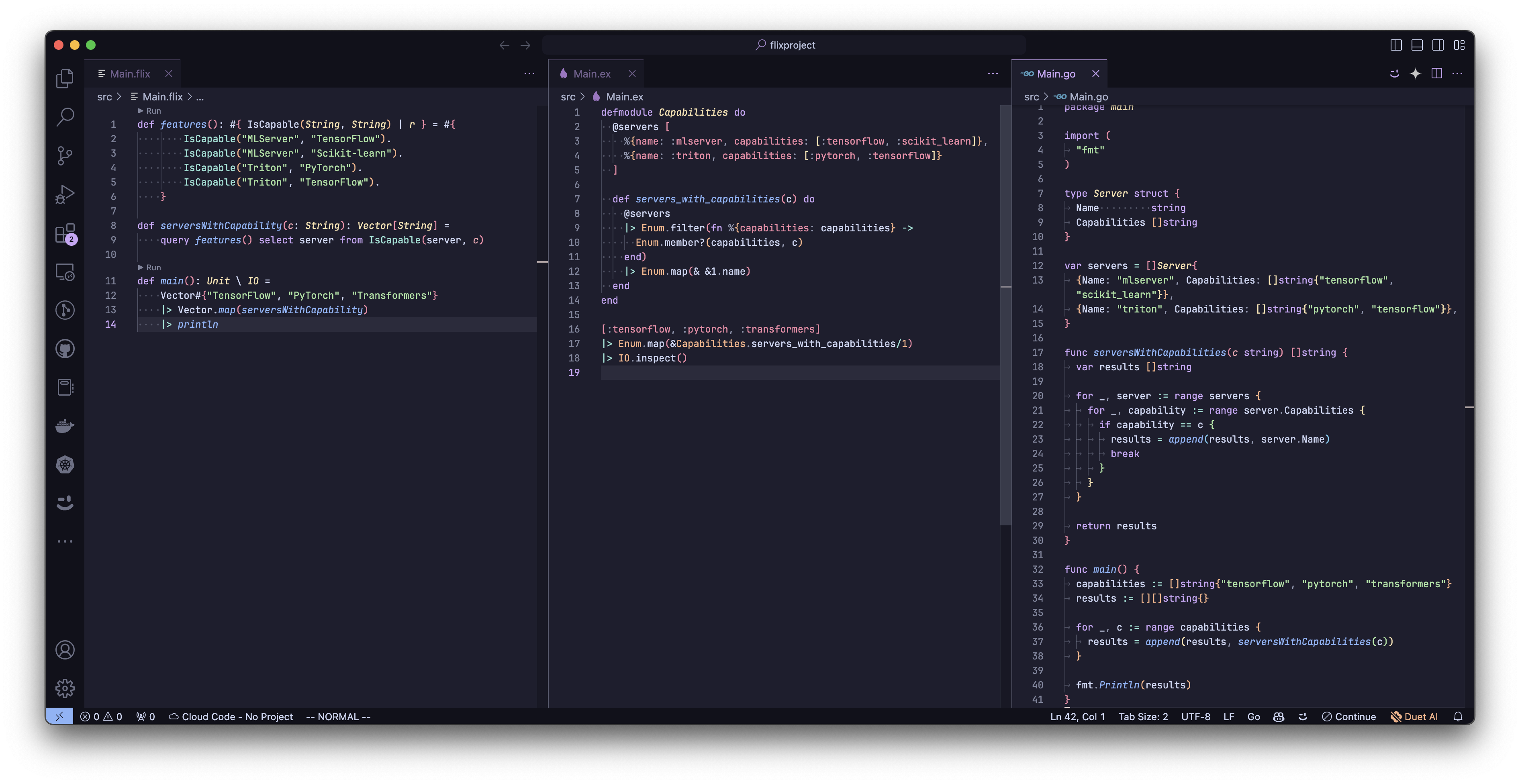We can't find the internet
Attempting to reconnect
Something went wrong!
Hang in there while we get back on track
Programming: Imperative to Functional to Logic
2024-02-23 (updated: 2025-04-30) ・ functional, imperative, logic, programming
How I started programming
This is about my journey with programming languages from imperative to functional to (potentially) logic.
Similar to most people, I got into programming with imperative languages. They were the programming languages (PLs) that I used at my first few jobs—specifically, ColdFusion, PHP, Java, Python, JavaScript, and some others.
Back in high school, I remember our IT teacher briefly introducing us to Prolog, of which I remember very little of, but it’s stuck with me as a neat idea ever since.
Then, I worked at a startup that used Go for the API and agents, and then Elm1 for the SPA. Why Elm? It was a fortuitous choice by the main frontend engineer. When I joined, there were roughly 4 current software engineers. Why Go? The usual reasons.
Elm, or rather functional programming was fascinating and eye-opening, as trite as that sounds. I won’t go into why as others have covered that extensively—though I would like to do so myself one day.
At my next job, there was another fortuitous choice of PLs of Elixir, since the technical co-founder was familiar with it and that it seemed like the right PL (including OTP) for the job.
We’ve reached a point in my hobby and career that I’m convinced functional programming is overall, better than imperative programming. It’s more fun too.
Okay, so Prolog
With Prolog, and the continuous search for The One True Programming Language. I’ve found Flix2, which may very well be it. It’s fairly novel in its design. I’ll quote their own answer to their question of “Why Flix?”:
Flix aims to offer a unique combination of features that no other programming language offers, including: algebraic data types and pattern matching (like Haskell, OCaml), extensible records (like Elm), traits (type classes) (like Haskell, Rust), higher-kinded types (like Haskell), typematch (like Scala), type inference (like Haskell, OCaml), structured channel and process-based concurrency (like Go), and compilation to JVM bytecode (like Scala).
Flix also supports several unique features, including: a polymorphic effect system, region-based local mutation, purity reflection, and first-class Datalog constraints.
The Datalog constraints, or declarative logic programming, combined with so many other ideal features was interesting, and it wasn’t long until I saw an opportunity to try it out.
A real world use-case for logic programming/constraint solving
At work, there was a snippet of Go code that was used to find running servers that satisfied having a certain capability (read: framework or runtime) to serve a machine learning model.. It would get/have the list of servers and loop through looking for ones that had the desired capability in its list of capabilities, and return those.
Flix calls the Datalog constraints fixpoints3. The Flix book on them was helpful.
Implementations by programming approach
I quickly threw something together. It’s very simple in that there’s a small set of facts (features()). It was so simple that I didn’t need to implement any explicit rule(s).
def features(): #{ IsCapable(String, String) | r } = #{
IsCapable("MLServer", "TensorFlow").
IsCapable("MLServer", "Scikit-learn").
IsCapable("Triton", "PyTorch").
IsCapable("Triton", "TensorFlow").
}
def serversWithCapability(c: String): Vector[String] =
query features() select server from IsCapable(server, c)
def main(): Unit \ IO =
Vector#{"TensorFlow", "PyTorch", "Transformers"}
|> Vector.map(serversWithCapability)
|> println
Output:
Vector#{Vector#{MLServer, Triton}, Vector#{Triton}, Vector#{}}
For comparison, I wrote Elixir and Go versions.
defmodule Capabilities do
@servers [
%{name: :mlserver, capabilities: [:tensorflow, :scikit_learn]},
%{name: :triton, capabilities: [:pytorch, :tensorflow]}
]
def servers_with_capabilities(c) do
@servers
|> Enum.filter(fn %{capabilities: capabilities} ->
Enum.member?(capabilities, c)
end)
|> Enum.map(& &1.name)
end
end
[:tensorflow, :pytorch, :transformers]
|> Enum.map(&Capabilities.servers_with_capabilities/1)
|> IO.inspect()
Output:
[[:mlserver, :triton], [:triton], []]
NB: I originally used an LLM with the prompt, “Convert this Elixir code to Go”, and received a functionally and syntactically code snippet.
package main
import (
"fmt"
)
type Server struct {
Name string
Capabilities []string
}
var servers = []Server{
{Name: "mlserver", Capabilities: []string{"tensorflow", "scikit_learn"}},
{Name: "triton", Capabilities: []string{"pytorch", "tensorflow"}},
}
func serversWithCapabilities(c string) []string {
var results []string
for _, server := range servers {
for _, capability := range server.Capabilities {
if capability == c {
results = append(results, server.Name)
break
}
}
}
return results
}
func main() {
capabilities := []string{"tensorflow", "pytorch", "transformers"}
results := [][]string{}
for _, c := range capabilities {
results = append(results, serversWithCapabilities(c))
}
fmt.Println(results)
}
Output:
[[mlserver triton] [triton] []]
Side-by-side comparison
An alternative view of the different implementations that highlights the differences, such as length.
Summary
I’ve already espoused my view that functional programming is generally preferable to imperative. I view logic programming, in a vague sense, as a higher level of thinking in that there’s less I need to instruct the computer to do, and can declare (or, describe) what is to be done, and let it figure it out for me.
One potential barrier to logic programming being adopted is that who wants to learn a whole new programming language that’s very specific, as opposed to Rust, Elixir, Clojure, etc that can solve a wide array of problems.
I’m honoured to have this linked to from the blog posts section of the official documentation4!
